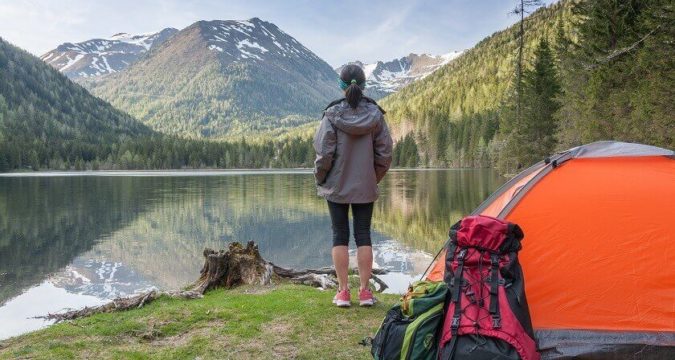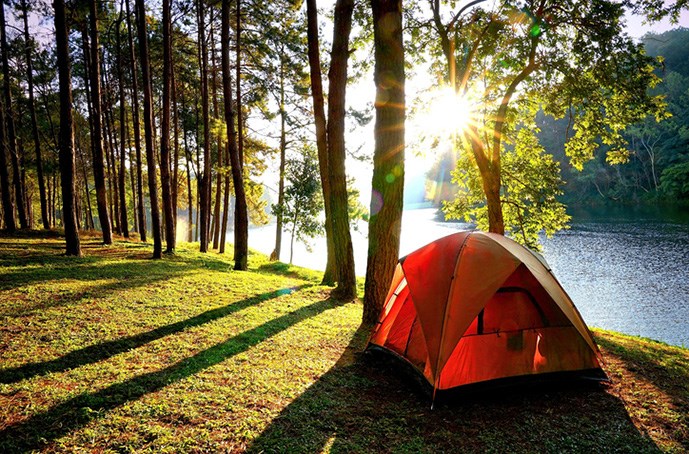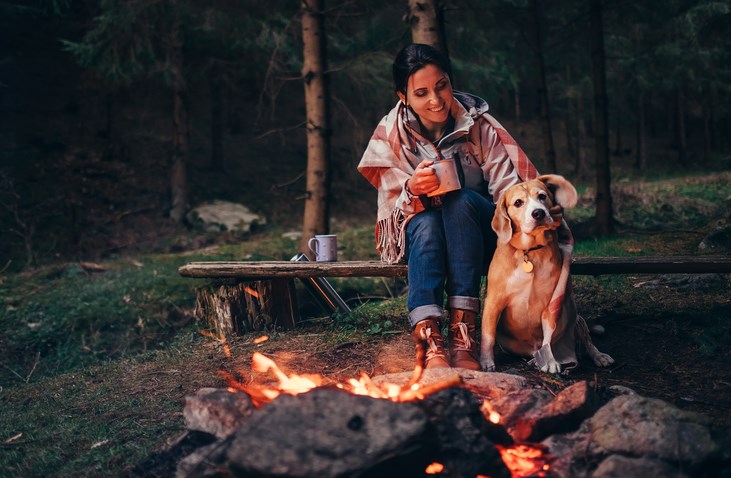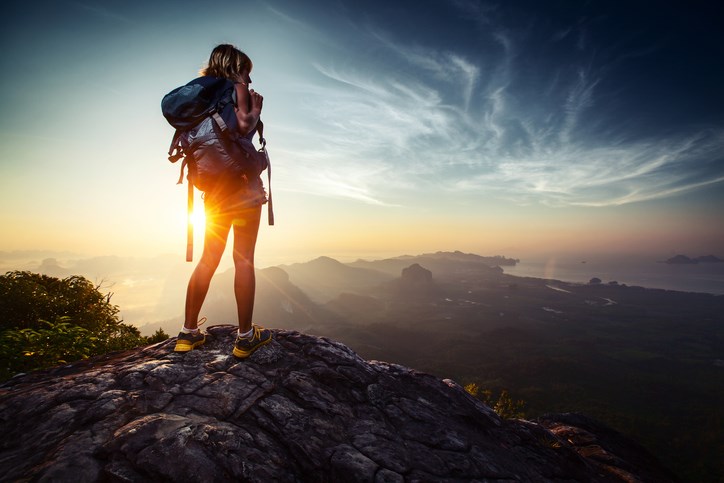
10 EXPERT TIPS FOR YOUR FIRST SOLO CAMPING TRIP

CAMPING ALONE? YOU BET! USE OUR EXPERT TIPS TO PLAN YOUR FIRST SOLO CAMPING TRIP AND START YOUR FAVORITE NEW TRADITION.
A camping trip is a great way to escape the busyness of everyday life, unplug, and reconnect with nature. However, sometimes planning a camping trip with others can be more stressful than it’s worth.
From trying to coordinate the schedules of multiple people, to ensuring everyone brings the gear they need, to figuring out who will be responsible for what meals, it can turn into more of a headache than it’s worth.
So, how do you enjoy all the fabulous benefits of camping without the stress of coordinating so much?
You go camping alone.
THE BENEFITS OF CAMPING SOLO
While camping solo means you won’t have anyone to tell stories around the campfire with, and you won’t have high-fives or a group photo after reaching the peak of that insane climb, there are some things you will love about taking yourself camping.
YOU CAN GO AT YOUR OWN PACE.
Whenever camping in a group, there are bound to be people of different speeds. Whether that means the speed of your hike, or the hours that you keep, it’s hard for everyone in a group to be on the exact same wavelength.
When camping alone, however, you don’t have to coordinate times with anyone. You don’t have to pick up the pace, or slow down during your hike to accommodate the others. You can hike as fast or as slow as you’d like, and you can stay up as late as you want (yes, we just said that).
YOU WILL LEARN A LOT MORE ABOUT CAMPING.
Group camping usually means there’s one person who is an all-star at putting up a tent, another who is great at starting a fire, and someone else who acts as a human compass.
Camping solo means you have to be all of those things at the same time and, though challenging, it will really push you and help you to expand your knowledge of camping.
YOU WILL FEEL MUCH MORE CONNECTED TO NATURE.
While camping in a group means late-night chats, entertaining hikes, and group-effort meals, it’s often you spend so much of your time and energy connecting with the other people in your group that you don’t get the chance to feel at one with nature.
However, going solo guarantees that you won’t have others to distract you, and you will feel a much deeper connection to nature, and thus experience your camping with heightened senses.
With no distractions, you’ll find the sunrises are even more stunning, and the wildlife that you come across will seem even more majestic.
YOU WILL GAIN CONFIDENCE.
Camping in a group isn’t particularly difficult. You have other people to rely on, should something go wrong, and if you forgot something, chances are good someone else remembered it.
But when you’re alone, you can’t rely on anyone else, and there is something incredibly freeing about that. Knowing that you can embark on this journey on your own will undoubtedly boost your confidence, and help you see a side of yourself you never know existed.
YOU WILL BE FREE OF STRESS.
Camping with others can sometimes bring along with it stress — stress in making sure everyone is having fun, stress in rounding everyone up for activities, stress in disagreements, and more.
When you’re camping on your own, you will have no stress. Leave behind thoughts of life back home (such as your job, bills, etc.), and allow yourself to do what you came here to do — relax.

TOP FIRST TIME SOLO CAMPING TIPS
Now that you know the incredible benefits of solo camping, you are almost ready to embark on your journey and reap all the rewards of this time to yourself.
However, there is one last thing: read over the below solo camping tips, and follow what they say to ensure your camping trip is safe and enjoyable.
1. WORK YOUR WAY UP TO GOING SOLO
If you’ve never been camping before, it would be a terrible idea to have your first time be alone.
Camping alone can bring challenges to even the most skilled solo campers, so don’t expect to just hop right into it without first going on some camping trips with others, and learning some basics.
2. FEEL CONFIDENT ABOUT YOUR CAMPING SKILLS
Knowing the basics is crucial to camping alone, but you need to feel like your skill level goes beyond a beginner.
- In order to successfully camp alone, you need to know how to:
- Navigate
- Pitch a tent
- Build a fire
- Clean water (in case your supply runs out and you need to rely on creek water)
- Set up camp
- Handle run-ins with wildlife (including big predators like bears)
- Forecast weather (so you don’t end up getting stuck in a storm)
- Deal with injuries and other things that require first-aid
There are other things that would be great to know before going out on your own, but the above list is the bare minimum you must be able to check off before you even think about heading out solo.
3. DON’T JUST GO FOR A NIGHT OR TWO
To be completely honest, sleeping alone in the wilderness is going to be uncomfortable.
You’re somewhere new and unfamiliar, and there’s a lot your brain can trick you into worrying about. So, if you’re only giving yourself a night or two on your solo journey, then you’re not going to reach the level of full enjoyment you’re after.
After a couple of restless nights, you’ll finally reach a point where you either become more comfortable, or just so exhausted that you’ll be able to sleep much better.
4. LEARN HOW TO KEEP YOUR MIND CALM
There will likely be times when camping alone that will send you into a flurry of worry and fear, especially at night. Every little noise in the wild seems infinitely louder, and infinitely more scary when you’re alone.
Know how to talk yourself out of worrying about things, and slow your mind down. Come up with a mantra or a little pep talk you can say out loud to yourself when you start to panic. Don’t worry about it sounding silly — it’s not like anyone will be there to judge you.
5. LIGHTEN YOUR LOAD
Since you only have yourself to pack things in and out, be mindful of what you pack. You only need enough for yourself, so be realistic about what you pack for your camping.
Rather than lugging in a tent and a sleeping pad, many solo campers opt for a hammock that only requires the addition of a sleeping bag. Or, if you’d prefer a tent, pick one that’s meant for one person, and is lightweight.
6. DON’T PICK A FARAWAY PLACE
For your first solo camping trip, it’s a good idea to pick a spot that’s close to your home, or one that you are very familiar with. The further you go from what you know, the more you’re opening up the possibility for something to go wrong.
In fact, before going on your trip, head out to the area for a day hike, or a bike ride to scout it out and get a feel for it.
Knowing your camping area well will be an immense help in you feeling comfortable, and also you being able to relax.
7. SHARE YOUR PLANS WITH SOMEONE
It is vital that you share your camping “itinerary” with someone at home before you leave even if you’re staying at a well-appointed campground.
At the very least, they need to know the day you’re leaving, the day you’re coming back, and where you’re going.
8. PACK AN EMERGENCY DEVICE
It is always better to be safe than sorry, especially when you’re out in the wilderness alone.
Bring along with you some sort of emergency device, a satellite phone or a personal locator beacon in case something goes wrong.
A satellite phone is a great way to check in with friends or family back home once in a while, so that they can rest easy knowing you’re safe.
9. BRING A BOOK
The camping time that is usually filled with conversation and storytelling when with a group won’t exist when you’re camping alone.
You’ll probably be surprised at the amount of silence you’ll be swimming in, as well as spare time.
To help keep yourself company, bring along a good book. This will also serve as a great aid in helping you get to sleep.
10. HOPE FOR THE BEST, BUT PLAN FOR THE WORST
We hate to sound pessimistic, but you do not want to go into the wilderness alone without an escape plan.
Should something go wrong, know the best way for you to get out, and the nearby areas you can go to for help, if needed.

While many people build up the thought of solo camping to be something that is impossible, and only doable for highly expert campers, as you can see from the above, it is possible. As long as you are prepared, there’s no reason you can’t head out and be one with nature on your own.
Camping solo is one of the most wonderful experiences you can have, and will connect you with yourself and nature in ways you never thought you’d be able to do.
So what are you waiting for?

